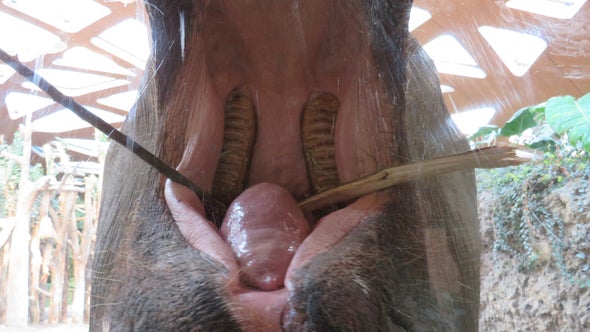(单词翻译:单击)
听力文本
This is Scientific American — 60-Second Science. I'm Karen Hopkin.
Elephants don't diet, as far as we know. But their weight does fluctuate, at least for the ones who live in a zoo. Now, researchers have found that this gain and loss in an elephant's mass appears to hinge on their jaws—more specifically, the unusual way these animals replace their teeth. The results appear in the journal Mammalian Biology.
Researchers at the University of Zurich's Clinic for Zoo Animals, Exotic Pets and Wildlife were exploring how an elephant's mass tracks with its overall physique—whether the animal is jumbo-sized or svelte, for an elephant. So they gathered data on the entire population of captive elephants throughout Europe.
The clinic's Marcus Clauss is a professor of comparative digestive physiology:
"This was due to the commitment of a student I had at the time, who is called Christian Schiffmann, who was the driving force behind all this. Because Christian visited basically every European zoo that keeps elephants."
He returned with records revealing the relative heft of the resident pachyderms. At first glance, his observations were not so surprising.
"As in western societies, also in the zoo, a lot of beings tend to be less than an ideal body condition and a little bit more on the obese side. And elephants are just the same in that respect."

But a deeper dive into the data turned up something curious.
"And that was that once the elephants reached what you would call adult age and adult body mass, there seemed to be something like a systematic cyclicity in the data: body mass going up and down and up and down over age."
The yo-yo effect didn't sync with seasonal changes in the animals' diet. And it wasn't because some of the females were getting pregnant and then giving birth. Because the researchers saw the same thing in both breeding and nonbreeding animals.
"So it must be something else. So Christian came up with the idea maybe it's related to the tooth cycle in elephants."
For most mammals, us included, baby teeth are replaced by a full-sized adult set. But because elephants are so big, and their jaws have to grow to keep up, they go through six sets of chompers, each bigger than the last. And the new teeth don't wait for the old ones to fall out—they push them out from behind. During the process, there are times when both sets are present at once. It's not that the extra teeth themselves weigh so much. It's more like more teeth means more food processing.
"And that means either they can eat more during those times or they can chew better during those times. Eating more evidently gives more energy. Chewing better also gives more energy because for an herbivore, the finer the chew the more energy they can get out of their food."
The ultimate confirmation of a connection between molars and mass may require the cooperation of veterinarians, who can ask their elephants to hop on a scale and say (elephant trumpeting).
Thanks for listening for Scientific American — 60-Second Science. I'm Karen Hopkin.
参考译文
这里是科学美国人——60秒科学。我是凯伦·霍普金。
据我们所知,大象是不节食的。但是它们的体重却会上下波动,至少生活在动物园里的大象会如此。现在,研究人员发现大象体重的增减似乎取决于其下颚——更准确地说,是它们换牙的不寻常方式。研究结果发表在《哺乳动物生物学》期刊上。
苏黎世大学动物园动物、异国宠物和野生动物诊所的研究人员此前一直在探索大象体重如何随其整体形态而变化——大象是体型庞大还是身形苗条。因此,他们收集了欧洲圈养大象整个种群的数据。
在该诊所工作的马库斯·克劳斯是比较消化生理学教授:
“这是我当时的学生克里斯蒂安·希夫曼的功劳,他是所有这一切的推动者。因为克里斯蒂安几乎走访了欧洲所有饲养大象的动物园。”
他带回来的记录展示了这种当地厚皮动物的相对体重。乍一看,他的观察结果并不那么令人惊讶。
“在西方社会,动物园里也一样,许多生物往往达不到理想体型状态,通常会有些偏胖。大象在这方面也是如此。”
但对数据进行更深入的研究后,研究人员发现了一些奇怪的现象。
“一旦大象达到人类所称的‘成年年龄'和‘成年体重',数据似乎出现了某种系统循环:体重随着年龄而上下波动。”
这种“溜溜球效应”并不与大象饮食的季节性变化同步。这并不是因为某些雌性开始怀孕并生产。因为研究人员在繁殖象和非繁殖象身上都看到了这种现象。
“那一定是因为别的原因。因此克里斯蒂安提出了这个想法,他认为这可能与大象的牙齿周期有关。”
对包括我们人类在内的大多数哺乳动物来说,乳牙会被正常大小的成年齿所替换。但由于大象体型过于庞大,其下颚必须不断生长才能跟上体型增长的步伐,大象要换6套牙,每套牙都比前一套大。而新牙不会等着旧牙掉下来,而是从后面把旧牙挤出去。在此过程中,会有两套牙同时存在的情况。大象体重增加并不是因为多余的牙齿本身非常重。更可能的情况是,更多的牙齿意味着更多咀嚼食物的过程。
“这表明,在那段时间里,大象要么能吃到更多食物,要么能更好地咀嚼食物。吃得多显然能提供更多能量。而咀嚼得更好也能提供更多能量,因为对于食草动物来说,咀嚼得越细,它们从食物中获得的能量就越多。”
最终确定磨牙和体重之间存在关联,可能需要兽医的合作,因为兽医能让大象跳上磅秤并说话(大象叫声)。
谢谢大家收听科学美国人——60秒科学。我是凯伦·霍普金。
译文为可可英语翻译,未经授权请勿转载!
重点讲解
重点讲解:
1. hinge on 有赖于;取决于;
The plan hinges on a deal being struck with a new company.
该计划完全取决于正在和一家新公司洽谈着的一项交易。
2. at first glance 乍一看;乍看上去;
At first glance, organic farming looks much more expensive for the farmer.
乍一看,有机耕作对农民而言似乎花费大多了。
3. turn up 找出;发现;注意到;出现;
Investigations have never turned up any evidence.
调查从没发现任何证据。
4. fall out (头发、牙齿)掉落,脱落;
His hair is falling out.
他的头发在脱落。


